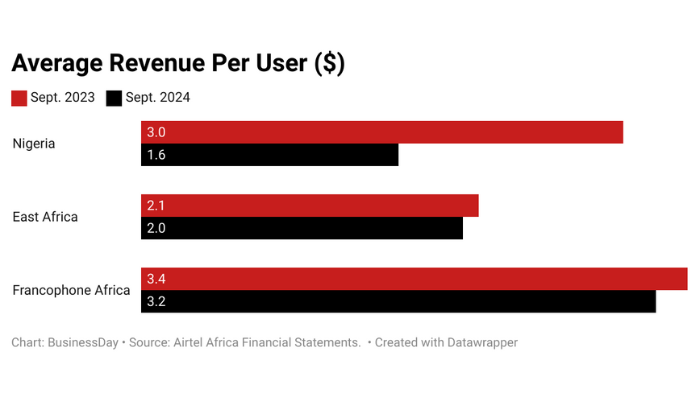The average revenue per user (ARPU) for Nigerian telecommunications companies declined by 40.87 percent to $1.85 in the quarter ending September 2024, compared to $3.12 in the same period in 2023, underscoring the negative impact of the weakened naira on the sector.
According to financial reports seen by BusinessDay, MTN Nigeria Communications Plc and Airtel Nigeria experienced ARPU drop to $2.09 (from $3.24) and $1.60 (from $3), respectively. In the period under review, MTNN’s service revenue grew by 33.6 percent to N2.4 trillion in the nine months ending September 2024, while Airtel Nigeria’s revenue decreased by 46.87 percent to $755 million.
Read also: Nigeria caps telecom tariff plans to follow India’s lead
“The financial performance of the mobile industry in Nigeria has slowed down in recent years after a long period of sustained growth,” said GSMA, the industry body for telcos.
Nigeria is now one of the lower-performing countries regarding telecom profitability in dollar terms.
MTN Nigeria, part of the MTN Group, which operates in 17 countries, has seen its position as the group’s top market (with a $5.03 ARPU in Q1 2023) fall to 13th place ($2.09 ARPU) in the third quarter (Q3) of 2024. Similarly, Airtel Nigeria dropped from being the second-highest-earning market ($3 ARPU) within Airtel Africa’s 14-country operations to the lowest at $1.60 ARPU.

“Revenue in naira has stopped growing as the number of subscribers has increased. Falls in ARPUs indicate pressure on prices and reductions in average usage,” GSMA explained.
In June 2023, the Central Bank of Nigeria (CBN) unified the foreign exchange market, causing the naira to plummet from N471/$ to N1, 043.09/$ by December 2023, and further to N1,690.37/$ by mid-November 2024. This led to $1.56 billion in foreign exchange losses for telcos in 2023. It also contributed to record-high inflation of 33.88 percent in October and a general rise in the cost of goods and services.
MTNN declared a loss of N514.93 billion for the nine months ended September 2024, and Airtel revenue fell to $2.37 billion from March to September due to currency devaluation in Nigeria.
The ARPU decline coincides with rising operational costs for telcos, who are facing increased financial pressure and have cut back on network investments. Airtel reported a roughly 90 percent surge in diesel costs. In comparison, MTNN’s operating expenses increased by 95.87 percent to N1.13 trillion for the first nine months of 2024, compared to N575.46 billion in the same period in 2023.
“In Nigeria, for instance, the industry has seen escalating energy costs, with diesel and petrol prices increasing by 66 percent and 257 percent, respectively, in 2023,” GSMA said.
Read also: Four predictions to expect for the tech and telecoms industry in 2025
Exchange rate fluctuations, depreciation, and high energy costs continue to erode telcos’ earning power. “Mobile service providers need to generate sufficient revenue to cover their operating costs and support this level of capex over the medium term. If this is not realised, they are likely to cut back on either capital or operating expenditure or both,” GSMA warned.
MTNN reduced its core capex spending by 27.79 percent to N217.64 billion in the first nine months of 2024, from N301.38 billion in the corresponding period. Airtel Nigeria’s capex fell 36.59 percent to $149 million from $235 million in the same period.
According to Bolaji Balogun, chief executive officer of Chapel Hill Denham, telcos need to invest $1 billion annually to meet the nation’s service quality requirements. This reduction in investment will worsen Nigeria’s deteriorating network quality, he said.
Karl Toriola, CEO of MTNN, noted that declining earnings are impacting investor confidence. “No one will put in a dollar and continue to get 66 cents… We are in a big crisis,” he said.
To address the crisis, telcos are exploring cost-optimisation strategies, including exploring renewable energy, to reduce diesel dependency. MTN Nigeria and Airtel have renegotiated contracts with their tower providers to lower diesel-related costs.
This decline in ARPU is driving calls for increased tariffs and a shift in operational strategy to optimise cost. Telcos are increasingly turning to renewable energy sources to reduce reliance on diesel. MTNN and Airtel Nigeria have renegotiated deals with their tower providers to reduce exposure to diesel cost components.
Calls for tariff increases in the sector have also intensified. “Pricing is needed for survival,” said Toriola of MTNN. “The government has to ensure that tariffs are good enough for businesses to thrive,” echoed Balogun of Chapel Hill Denham.
Gbenga Adebayo, the chairman of the Association of Licensed Telcom Operators of Nigeria (ALTON), emphasised the urgency of finding sustainable solutions.
Read also: Telecoms FDI grows to 7-year high despite hurdles
“We need to find a long-term, sustainable, and manageable solution to this problem. Prices will need to rise, but action needs to be taken in a measured way through sustainable conversations and partnership with the government. It is time to address this head on,” he said.
However, Bosun Tijani, minister of Communication, Innovation, and Digital Economy, has argued that raising tariffs alone will not solve telcos’ problems.
“There are tons of other things that we must do to ensure that the business environment is conducive for the investors in this space. And the government is active, including in the tariff conversation,” he said.
Insiders at the Nigerian Communications Commission (NCC) acknowledged the sensitivity of a price review given the critical role of connectivity in Nigerians’ lives and the impact an increase may have. However, they stated that the commission is reviewing telcos’ requests for adjustments.
